This morning (thanks to a tip from Search Engine Roundtable) I began researching what looked like authorship snippets on Bing. While it’s only been an hour or so here’s what I’ve seen and what I think I’ve figured out.
People Snippets
The new faces (for the most part) showing up in Bing search results are not authorship snippets per se but are people snippets derived from entities. It’s about who the content is about rather than who created the content.
If you haven’t seen them already here’s what one looks like when you search for Lauren Cohan.
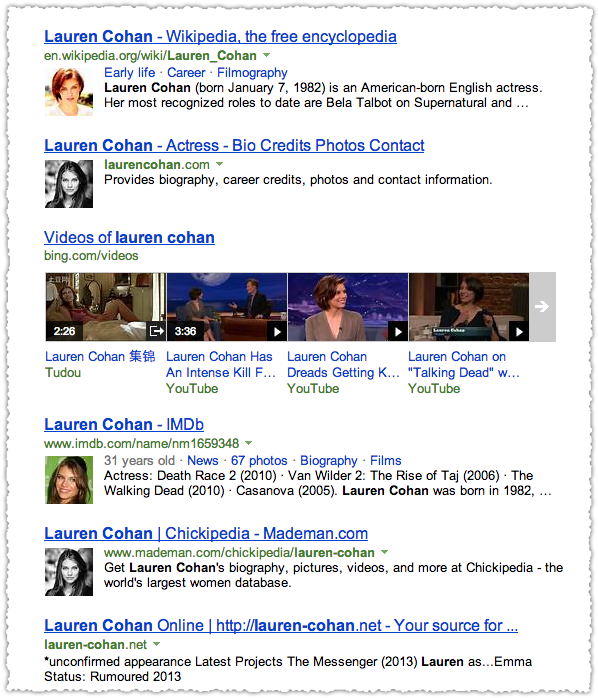
They look remarkably like the authorship snippets that Google has implemented but they’re most certainly different in their application.
Structured Data?
The first assumption here is that Bing might be using structured data to present these new snippets. Perhaps they’re using the person attribute in schema.org markup?
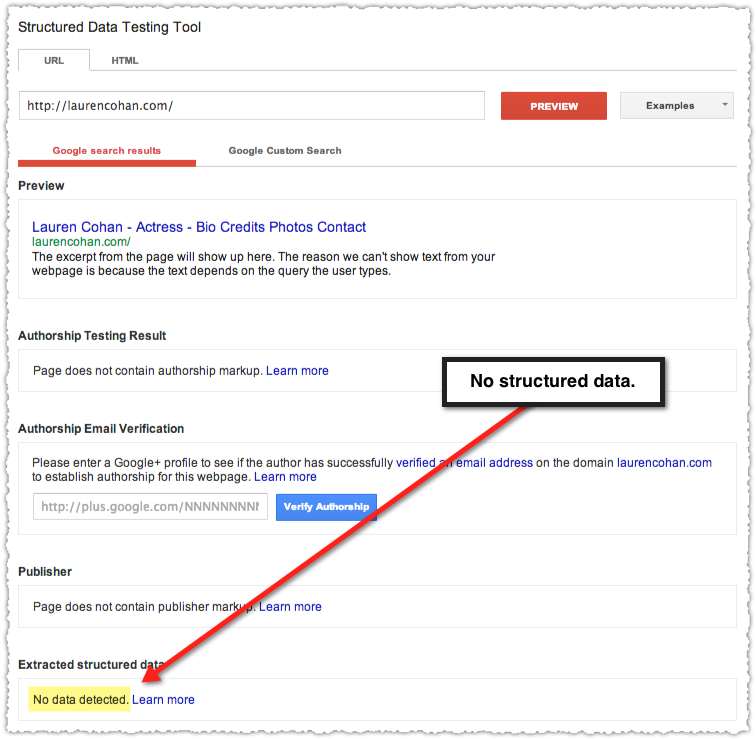
Not so much. There’s no structured data on this page and I’ve found plenty of others getting the people snippet that are devoid of mark-up. So if Bing isn’t using structured data, what are they using to match and identify people?
People Pages
Clearly they rely heavily on sources such as Wikipedia, LinkedIn and Freebase. But they seem to be expanding their data sources on people to other sites and specific pages.
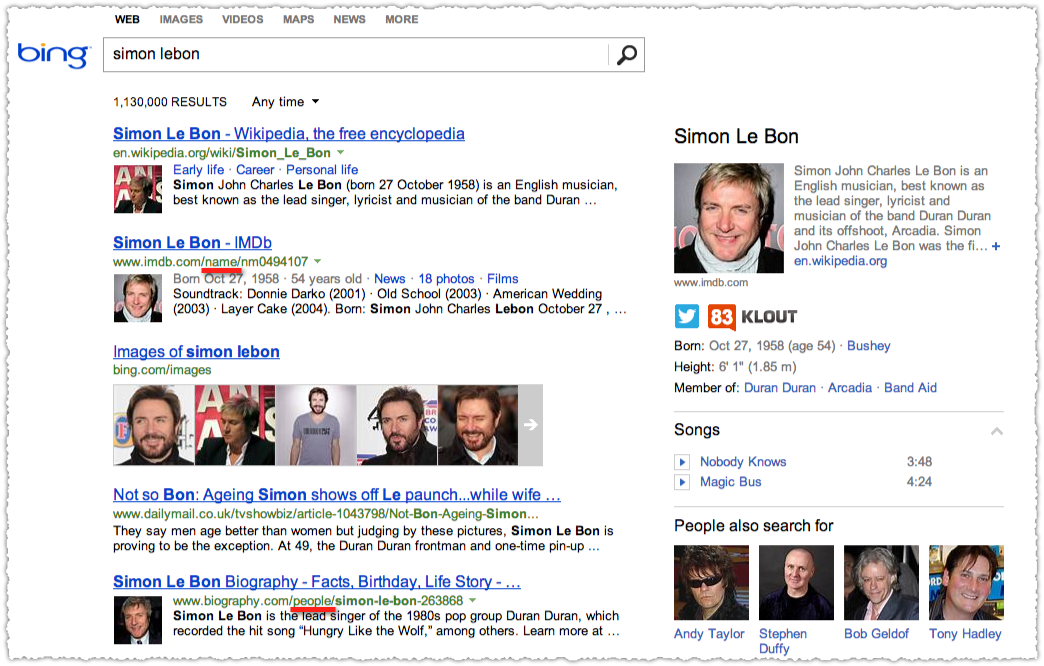
Searching for Simon Le Bon you’ll find that a people snippet appears for Wikipedia, IMDb and Biography. Wikipedia is a no-brainer and IMDb makes a good deal of sense too. Biography was the surprising one.
I noted that both IMDb and Biography had namespaces or folders (underlined in red) that seemed to be easy identifiers for entities. So I decided to look for more sources and I found them. Lots of them.
CrunchBase

MySpace

NBA.com

Quora

TED

ESPN

The Canadian Encyclopedia

Amazon

MTV

Last.fm

Forbes

NNDB



Yahoo! Movies

Hollywood.com

AskMen

FriendFeed

TV Guide

Comedy Central

Most of these either have a namespace that makes it easy to identify as a person or are clear profiles in the case of MySpace and FriendFeed. Whether it’s ‘player’, ‘artist’, ‘celebrities’, ‘person’, ‘profiles’ or ‘speakers’ it seems like Bing has determined pages that match these specific entities.
About Pages
People snippets show up far more often on about pages which supports the idea that Bing is looking for high confidence entity pages and not assigning real authorship.
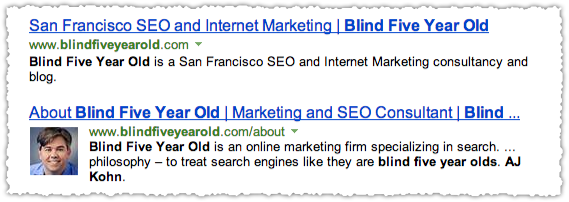
As you can see I get a people snippet on my about page but not on my site as a whole. Nor do I get it returned on any of my content. Here’s another example.
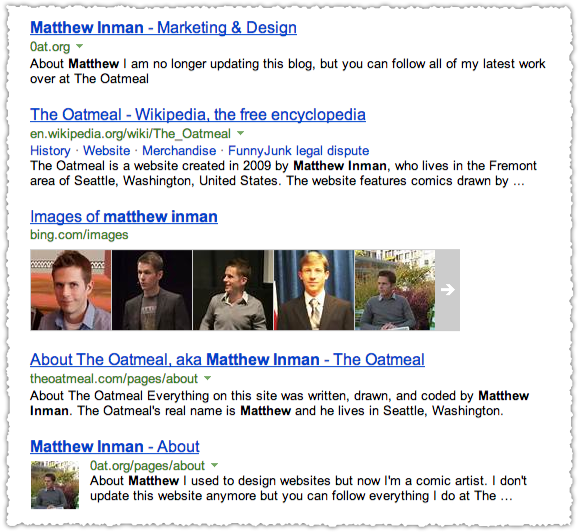
Again, the about page on Matthew Inman’s now defunct site is given a people snippet while the site as a whole isn’t. The people snippet is showing pages about that entity, not authored by that entity. It just so happens that there’s some overlap in those areas.
Sorta Structured Data
Many of these pages have a rich amount of data on them. While they aren’t marked-up with any structured data per se, search engines can clearly parse and use that information. Here’s a people snippet via Green Day Authority.

That page has no structured data mark-up but it has structure.
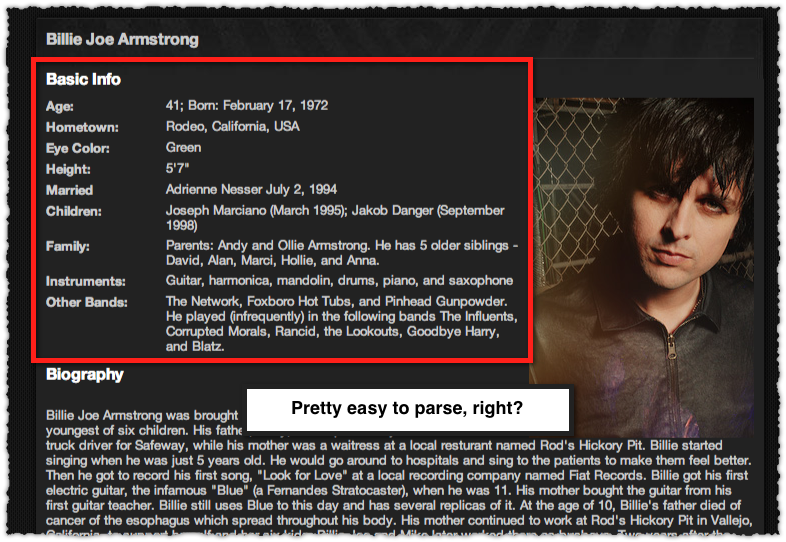
Characters?
Further pushing on the choice of pages to use to apply the people snippet I began to search for characters. First Harry Potter and then Derek Zoolander.
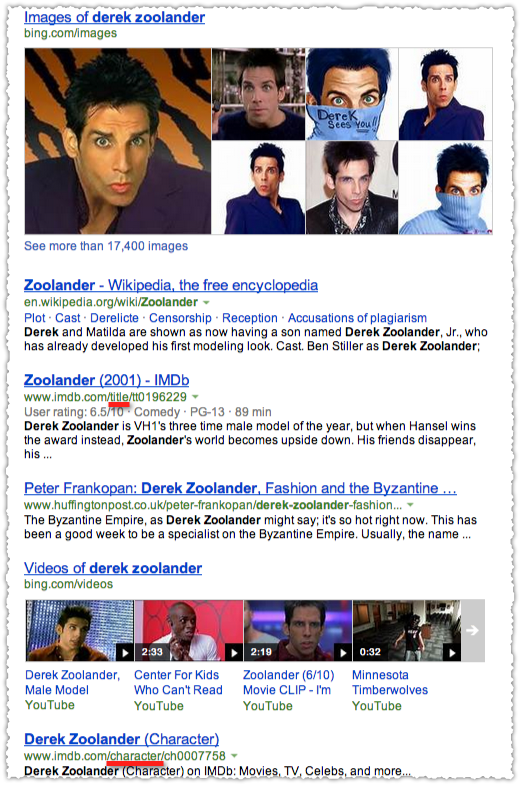
No people snippets are applied even though it’s still pulling from IMDb. The difference here is that it’s plucking out a title page and a character page instead. Maybe that’s not how it works but that’s how my pattern matching mind sees it right now.
[Update 3/21/13]
ChaosSEO noted that he could get character names to render people snippets. Sure enough, you can.
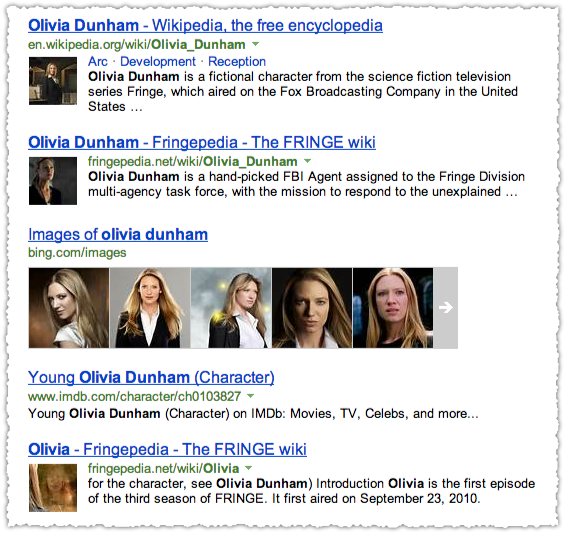
And …
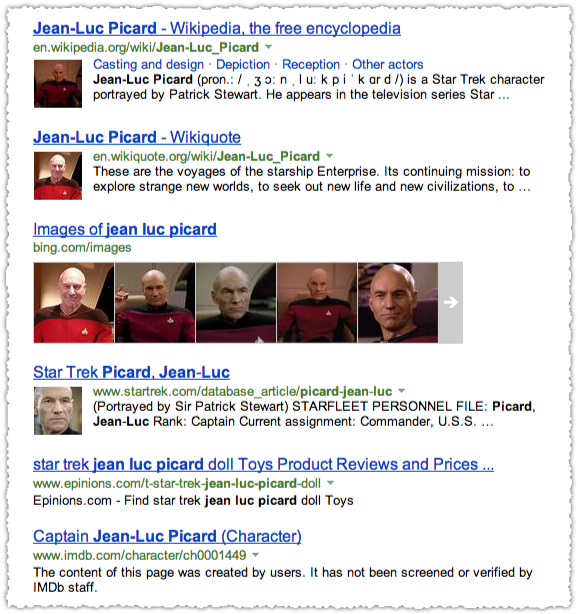
I tend to think that there’s some special casing going on with IMDb so that it only applies the snippet to the name pages, but if you get a snippet to render for an IMBb character page please let me know.
Going through characters was actually really instructive. First I began to see that there were associations between the entities of person and character.
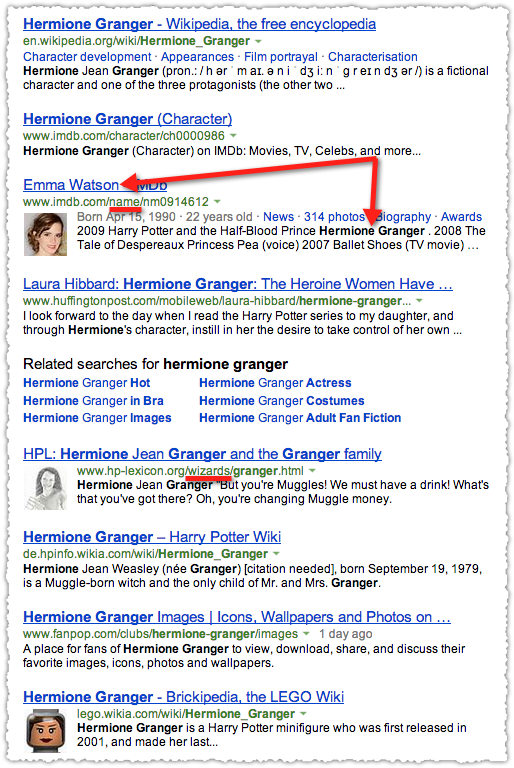
A search for Hermione Granger produces people snippets and a result for Emma Watson. Clearly there’s some understanding that the two are related. You can get that same dynamic for a number of character searches such as Gandalf or Chewbacca.


Finally, I found a result that makes me very confident that this is not authorship at all but entity detection.
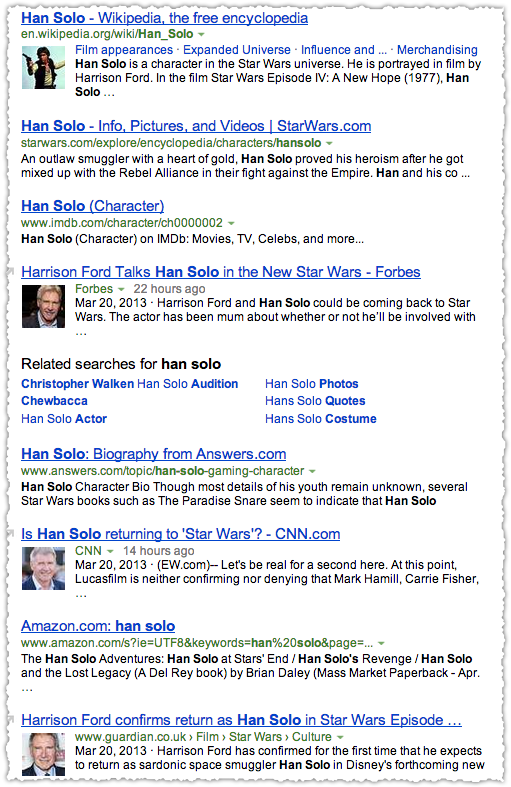
Clearly Harrison Ford (or Han Solo) is not the author of these pieces but the subject of them.
Decentralized Images
There are few instances where a site will get a people snippet. This seems to be rare and only occurs when Bing has high confidence that they have the right person.

Here we can see that a people snippet is applied to Seth’s site but that the image is pulled from that site and not from some central database. This provides some variety in what is displayed but also leads to some errors from time to time.
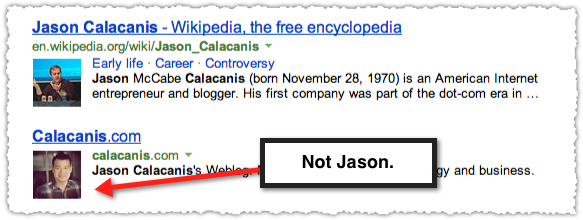
So Bing seems confident that they have the right person associated with that site but the image they pulled is not Jason. It’s Wesley Chan.
Authorship?
Is this a form of Authorship? Sorta, kinda, not really. Sometimes you’ll see what looks like a people snippet pop up on a content page.

Tim is the author of that piece so there’s a chance that they’ve identified and are trying to present Authorship based on that fact. But it’s more likely they just identified him as an entity. Because the images are decentralized it pulls what it can from that article.

Same thing happens with this piece by Mathew Ingram. In both cases there is structured data on that page that would indicate that each is the author of that piece (though they both don’t have Google Authorship working.)
So it’s not true authorship and very few pieces of content have a people snippet right now but if Bing decides to follow this path, make the connections with all of their datasets (including their social sidebar results) then you could see Bing being a legitimate authorship platform.
Right now it seems like the snippets on content results are more like a side effect of people identification.
TL;DR
Bing has introduced people snippets that look like Google’s Authorship snippets but are more focused on identifying people as entities through a variety of sources rather than assigning authorship of content. For now.
The Next Post: Tracking Image Search In Google Analytics
The Previous Post: Build Your Authority Not Your Author Rank

3 trackbacks/pingbacks
Comments About Bing People Snippets
// 7 comments so far.
Anthony Pensabene // March 19th 2013
i just toyed around a bit myself.. site searches don’t elicit any images for blindfiveyearold or my blog thus far… also, i don’t use bing very much, but notice suggested image searches (suggesting other people) when searching names?
James A. Holloway // March 19th 2013
Tried searching “Blind Five Year Old” myself, and got your main page but not your about page with headshot.
Searched for myself using quotations “James A. Holloway” and it returned my About.me page, my Linkedin page (with headshot), my Google+ page, and my twitter page as well as several other results that were not me.
Chase Billow // March 19th 2013
And not just About pages. In the “Matt Cutts” example, all Bing needed was a human photo (after correction) and strong enough signals to display a thumbnail from the image on the page of the search result.
My advice – if you care about Bing, have a Bio page (when appropriate) with a clear headshot and appropriate alt/title tags as this is also appearing for branded searches, not necessarily just people searches (although it seems the brand has to be pretty closely related to the person). One photo seems best.
Lars Skjoldby // March 19th 2013
Amazing how far you got at so little time.
By the way, it only seems to work with Bing United States – English.
I just tested in Danish, German, United Kingdom and United States – Spanish, and here’s no people snippets.
And funny how it selects Matt Cutts halloween costume as the people snippet.
Siegfried // March 19th 2013
Ha!
Correct me if I am wrong – is the autorship gonna be the word of 2013 ? seems so!
best regards!
Chad Henkel // March 20th 2013
AJ here’s a question: for decentralized images, have you seen entity (like the Tim Gun example) game and/or test whether the images they use increase CTR? It’d be interesting to see…
AJ Kohn // March 21st 2013
Chad,
There’s been some research on Google Authorship photos that different photos can lead to higher CTR. Just like in real life, pretty folks often have a bit of an advantage, particularly on that first glance. For Bing, you might be able to try to do that but the selection of the image doesn’t seem very uniform right now so I think it would actually be harder to game right now.
Sorry, comments for this entry are closed at this time.
You can follow any responses to this entry via its RSS comments feed.